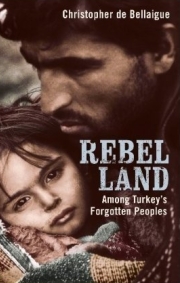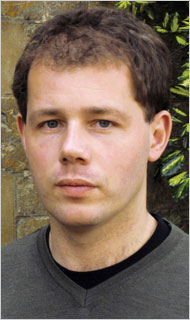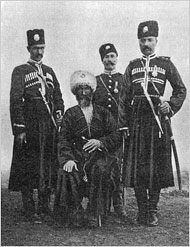Ilankai Tamil Sangam30th Year on the Web Association of Tamils of Sri Lanka in the USA |
||||||
 Home Home Archives Archives |
'Rebel Land'; by Christopher de BellaigueBook review by Marjorie Miller, Los Angeles Times, April 25, 2010
De Bellaigue explains that a love affair took him to Turkey in 1995, where he also fell in love with the country and absorbed founding father Kemal Atatürk's official narrative, that it was a secular republic, more Western than Eastern, whose ethnic, religious and political minorities had no legitimate claims. Six years later, he wrote an essay for the New York Review of Books in which he explained the massacre of up to half a million Armenians in 1915 as part of the chaos accompanying the end of the Ottoman Empire. He was inundated with letters saying that the toll was more like 1.5 million and in an orchestrated genocide. This book is his repentance and, he says, a betrayal of his Turkish friends. Because many of the official documents of Turkish history are locked away by the state, De Bellaigue focused on the remote district of Varto in mountainous southeastern Turkey, a kind of ground zero of the country's ethnic conflicts that had been caught up in both the massacres of 1915 and the Kurdish rebellion of 1925. This is rough terrain, shaped by coups and earthquakes and controlled in turn during the 20th century by Ottomans, Russians, Armenians and Kurds. It has produced many rebels and not a few turncoats among its multifaceted population. De Bellaigue tries to humanize them, offering a close-up look at their faces and foods and bloodied landscape, where bodies are set alight, pierced by bayonets and boiled in cauldrons. De Bellaigue notes that he was regarded with suspicion from all sides, even the Kurds, Alevis and Armenians who presumably stood to gain by a non-Turkish history. Turkish officials dogged him; in one encounter, a plainclothes police officer greeted him with a public kiss on both cheeks and grabbed his arm for a stroll down the street — a gesture clearly designed to cast doubt on his credibility. Presented with multiple versions of a single event, he sometimes became convinced that all sides were lying. As he sat down to write, he realized: "I had heard diametrically opposed accounts of things that happened 100 years before or last week." The common trait among these competing stories is that they present their own suffering in great detail while failing to mention their crimes. This, De Bellaigue shows us, is the enriched verbal uranium that fuels these conflicts to this day. De Bellaigue is a lovely writer, thorough reporter and deep thinker, although his mix of historical figures and local characters is sometimes hard to follow. He understands the importance of language (as did the Turks, who tried to wipe out the Kurdish language). When it comes to the question that started his journey, he writes that, coming as they do from far-flung corners of the world, "it is hard to take issue with much of the detail that one finds in the Armenian accounts of the events of 1915." That said, nearly 100 years later, the sides are caught in an absurd battle over the word "genocide" that is "a travesty of history and memory." What's needed, he says, is a new word, even as he dismisses such a fantasy as "the prattle of a naïf, laughable, unemployable." Miller is a foreign policy editorial writer for The Times. ------------------------------------------------------------------------------------------ Turks, Kurds, Armenians: View From a Small Town by Joseph O'Neill, The New York Times, March 7, 2010 Excerpt: ‘Rebel Land’ (pdf)
In 2005, Christopher de Bellaigue, a British journalist, installed himself in a remote, forbidding Turkish town and, by so doing, acquired an anguished intimacy with the region’s peoples and their secret and mythic pasts. This extraordinary intervention — which can be read as old-fashioned Orientalism or, more generously, as a globalized conscience courageously at work or, most accurately, as a bit of both — has a reflexive subplot, namely de Bellaigue’s own intellectual and moral odyssey, which is of an unusually vulnerable and romantic character. Dwight Garner’s Review of ‘Rebel Land’ (March 3, 2010) As de Bellaigue freely explains in “Rebel Land,” a love affair drew him to Turkey in 1995, whereupon “the love affair ended but Turkey captivated me.” He stayed (in Ankara and Istanbul, writing for The Economist), learned to speak Turkish fluently and, immersed in a Westernized environment, more or less unwittingly became a Kemalist, which is to say, a subscriber to the “foundation myths” promulgated by Kemal Ataturk and holding sway in Turkey ever since. Notable among these are the notions that the Turkish republic is a nation-state containing no subgroups with valid claims to ethnic or political differentiation, let alone autonomy; that the country has a European and secular essence and destiny; and, more emotionally, that the achievement of Turkish nationhood was an enterprise reflective of a righteous people who to this day remain victimized by the self-interested incomprehension of the West.
In the grip of such prejudicial ideas, de Bellaigue in 2001 wrote an article for The New York Review of Books containing a blandly pro-Turkish account of the fate of the Ottoman Armenians. To de Bellaigue’s somewhat surprising surprise, this excited a furious response. The controversy led the writer to a searching, shameful examination of his sources and his soul: “I had been charmed by the Turks, and perhaps intimidated by their blocking silence” about the Armenians. “I had helped to keep Turkey’s past hidden.” It may strike some as odd that a leading authority on modern Turkey should be capable of such a blunder; an honest scrutiny of the plentiful and detailed accounts of the 1915 events provided by (overwhelmingly Christian) bystanders and survivors makes the case for an Armenian genocide hard to resist. On any view of the available materials — the Ottoman archives remain largely forbidden to scholars — the Armenians suffered a comprehensive and horrifying ethnic cleansing from their ancient homeland. But de Bellaigue had failed to scrutinize these materials, for the simple reason that he had, more or less literally, gone native. It was only after he left Istanbul for Tehran (prompted by another, happier love affair, with an Iranian who is now his wife) that his Turkish ties began to shrivel and he came to realize he was “no longer a Turk.” By 2005, he was ready to make amends for his offenses against history, even if he would thereby go behind Turkey’s back “and betray it.” The betrayal took the form of repeated visits to “a little place in the middle of nowhere” named Varto, and in this way de Bellaigue climbed “down from the crow’s nest of history” to a place where “the science of history has been so abused and neglected . . . that it barely exists.” Varto, we learn, is an exceedingly complicated place. Situated in Turkey’s beautiful, mountainous far east, in the early 20th century it was controlled in short succession by the Ottomans, Russian invaders, Armenian nationalists and Kurdish rebels. Nowadays the town and surrounding district are populated by Kurds, a very few vestigial Armenians and a small minority of Turks. (This part of the world is also home to the Zaza people, but de Bellaigue makes no mention of them as such.) This ethnic complexity is aggravated by tribal divisions (among the Kurds) and by an unruly spillage of religions. Most Varto Kurds are Sunni Muslims, others are members of the oppressed Alevi sect; ditto the Turks. The Armenians of Varto are Muslims (their Ottoman ancestors having prudentially converted from Christianity). Local speech is also a hodgepodge. Kurds speak Kurmanji or Zaza and in any event Turkish. These languages are likewise distributed among the Alevis. The Turks speak Turkish and make a political point of it, unless they are Alevi Turks, in which case they may empathize with the Kurds and their persecution. De Bellaigue responds with outstanding energy and courage. Lodging at Varto’s Teachers’ Hostel, he is tailed by the police and military intelligence and suspected of being a spy. Nonetheless, he perseveres, talking to, on the one hand, the captain of the gendarmerie, the police chief and the district governor and, on the other hand, herdsmen and Kurdish guerrilla fighters. He tracks down descendants of famous and infamous figures in Varto history, and in Germany, he speaks to exiled Kurdish nationalists. He constructs an unflinching and painstaking history of the local Armenian apocalypse and deconstructs the Kurds’ inevitably shaky versions of their past. If one thing becomes clear, it’s that the region, indeed Turkey itself, is buried in a thick ethnographic and historical cloud that is only deepened by its various inhabitants, who, in this regard, are helpless particles of fog. The people of Varto are smothered by the official narratives of the Turkish state, credulous of family and tribal lore and guerrilla propaganda, subdued by censorship and hypersensitized by inherited and actual grievances. Their sense of themselves and their neighbors is built on vagueness, prejudice, misconceptions, hearsay and, above all, fear. Fear is general all over Turkey. De Bellaigue investigates this mess brilliantly and evenhandedly (if occasionally emotively). Analytically, however, he can be abrupt. He describes Varto as “a place under occupation” before concluding, a little too tersely, that the “Kurdish movement in Turkey . . . is a mirage.” With regard to that hottest of potatoes, the Armenians, he deplores as “a travesty of history and memory” the divisive obsession with the question of genocide: “What is needed is a vaguer description for the events of 1915, avoiding the G-word but clearly connoting criminal acts of slaughter, to which reasonable scholars can subscribe,” thereby promoting “a cultural and historical meeting between today’s Turks, Kurds and Armenians.” This is an important and potentially attractive suggestion, but de Bellaigue declines to elaborate its moral and philosophical foundations; a pity, since he has earned the reader’s trust. It’s a sense of trust, though, that “Rebel Land” ultimately bequeaths — a rare, remarkable feat, given the treacherousness of the terrain. De Bellaigue concludes his personal story with the information that, having wandered restlessly among “the tall stalks of identity,” fatherhood has returned him to England and to a new appreciation of his citizenship. That may be so; but whatever his protestations to the contrary, his heart remains part Turkish. And Turkey, however much it may not like it, is lucky to have Christopher de Bellaigue. This book ought to be compulsory reading from Batman to Bodrum. Joseph O’Neill’s most recent novel is “Netherland.” His memoir, “Blood-Dark Track: A Family History,” will be published in paperback in the fall. |
|||||
|
||||||
 ...
In "Rebel Land: Unraveling the Riddle of History in a Turkish Town," Christopher de Bellaigue, a former correspondent for the Economist [and The New York Review of Books], mines histories of the centuries-old conflict among Turks, Armenians and Kurds that omit the grievances of any other side, distorting their heroes and rights, indeed their very identity.
...
In "Rebel Land: Unraveling the Riddle of History in a Turkish Town," Christopher de Bellaigue, a former correspondent for the Economist [and The New York Review of Books], mines histories of the centuries-old conflict among Turks, Armenians and Kurds that omit the grievances of any other side, distorting their heroes and rights, indeed their very identity. 
